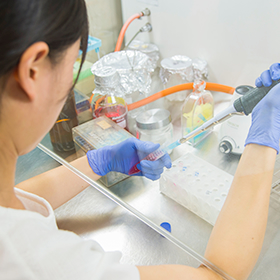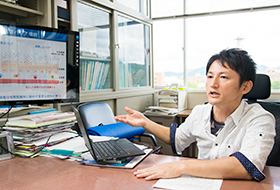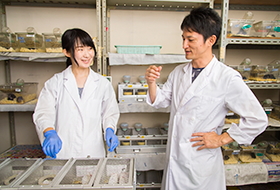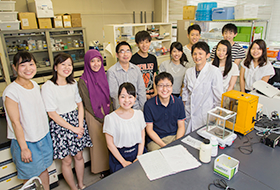 |
| |
 |
| |
| Studying the intestinal barrier related to the onsets of various diseases |
| |
 |
|
Professor Takuya Suzuki is a specialist in food functional science. He is studying primarily the functionality of food and its health effects and disease-preventing benefits. His recent research interest has centered on the intestinal barrier function. With a particular focus on the intestinal tract, Prof. Suzuki is enthusiastically committed to research on food components that help maintain the homeostasis of the intestinal tract.
He explains that “The digestive tract is the path of food we eat, stating from the mouth to final expulsion through the anus. What we call ‘biological barriers’ play roles in separating the inside and outside of the human body and in partitioning the body into several compartments. One of them is the ‘intestinal barrier,’ which is the main subject of my present research. The inside of the intestinal tract, in reality, corresponds to the outside of our body.” |
|
| |
To our surprise, the structure of our body can be likened to a tube, according to the professor. In general, the surface area of the human intestinal tract is about the size of a tennis court. Since the intestinal tract has large area of contact with the “outside world,” the intestinal barrier is extremely important in that it prevents foreign matter from entering into the body via the intestinal tract—which corresponds to the outside world.
If the intestinal barrier is damaged, foreign matter in the intestinal tract will enter the body, causing inflammation not only in the intestinal tract but also in other organs through the bloodstream. For this reason, Prof. Suzuki, who had previously studied only intestinal barrier impairment and intestinal diseases caused by the invasion of foreign matter into the body, has recently expanded his research scope to include the relationships between the intestinal barrier impairment and skin or kidney diseases.
His laboratory mainly studies probiotics, such as lactic acid bacteria and Lactobacillus bifidus, as well as prebiotics, such as dietary fiber and oligosaccharides, striving to clarify their actions on the intestinal barrier. |
|
 |
|
| |
| In quest of food and components that can enhance and protect the tight junction structure |
| |
 |
|
Of several mechanisms of the intestinal barrier, Prof. Suzuki focuses special attention on the tight junction structure.
He states that “The tight junction structure is a kind of intercellular junction, featuring adhesion molecules with a function that closes spaces between cells just like a fastener. It is known that foreign matter can invade via these intercellular spaces and impair the barrier function. We therefore work to investigate how this structure can be enhanced and protected by food.”
When he was a student, he conducted research regarding calcium absorption in the intestinal tract. In the course of that research, he began to address the tight junction structure that regulates paracellular absorption. Prof. Suzuki also recalls that he then became interested in the tight junction structure, when he learned that the structure not only plays a role in the absorption but also serves as a barrier. |
|
| |
After completing his doctorate, he went to the United States to study at the University of Tennessee, which conducts specialized studies into biological barriers. Subsequently he worked as a researcher at a Japanese manufacturer, and started to work at Hiroshima University in 2010. At present, he is also active in the Research Center for Japanese Foods—Innovative Research & Development Core for Japanese Foods and Fermented Foods, which is one of the Hiroshima University Promising Research Initiatives.
According to Prof. Suzuki, although many research teams study the effects of food on human health both in Japan and overseas, there are very few teams that primarily pursue food components and the intestinal barrier. As such, his team has been highly evaluated for its research findings, wining several academic awards. |
|
 |
|
| |
 |
|
Smiling, he says “In recent years, the intestinal barrier has been spotlighted. However, many questions remain unsolved regarding the regulation of the intestinal barrier and food components. There are plenty of unknowns, even concerning food that is very familiar to us and its composition. I think that clarifying these as-yet-unknown functions leads to real pleasure in our research.” |
|
| |
| Our goal is to develop innovative functional food, the first of its kind in Japan. Why not join our research activities? |
| |



|
|
Prof. Suzuki describes the objectives of this research as follows:
“In addition to elucidating the relationships between food components and the intestinal barrier function, we have another objective. As of yet, there is no functional food that is instrumental in improving our health by enhancing and protecting the intestinal barrier. We therefore strive to pioneer development of such innovative functional food in Japan, based on the mechanisms of the above-mentioned relationships.” His ultimate goal is to translate research findings into tools for preventing diseases and improving human health. It appears that his team’s research outcomes will be put into practical use in our everyday life, in the not so distant future.
Meanwhile, Prof. Suzuki says that he seeks to make his laboratory a place where every member can enjoy their research activities. He invites young people to join his future research activities in a well-developed research environment. Here is a message from Prof. Suzuki to these prospective students:
“In doing research, you will find that more often things don’t go the way you plan or want them to. Nevertheless, please remember that you should always maintain the positive attitude of enjoying even such difficult situations. It is important to acquire the ability to observe and approach a problem from various angles based on a broad perspective. I’d also like to remind you all that while research is individual work in some aspects, in many other aspects it is team work to be carried out together with your colleagues and partners. Consequently, it is absolutely essential for researchers to cultivate social skills and a spirit of cooperation. Through research activities, I hope that my students will grow themselves while developing these qualities.” |
|
| |
| Takuya Suzuki |
| Professor, Laboratory of Food Chemistry
April 1, 1989 – December 3, 2000 Researcher, Nutritional Science Research Center, Meiji Dairies Corporation
April 1, 2000 – March 31, 2002 Senior Staff, Saitama Plant, Meiji Dairies Corporation
April 1, 2005 – June 30 2008 Special Postdoctoral Researcher, Japan Society for the Promotion of Science
July 1, 2008 – December 31, 2009 Postdoctoral Fellow, Research School of Agriculture, Graduate School of Agriculture, Hokkaido University
January 1, 2010 – March 31, 2013 Associate Professor, School of Applied Biological Science, Hiroshima University
April 1, 2013 – March 31, 2016 Associate Professor, School of Applied Biological Science, Hiroshima University
April 1, 2016 – present Professor, School of Applied Biological Science, Hiroshima University
Posted on Jan 5, 2017
|
| |










